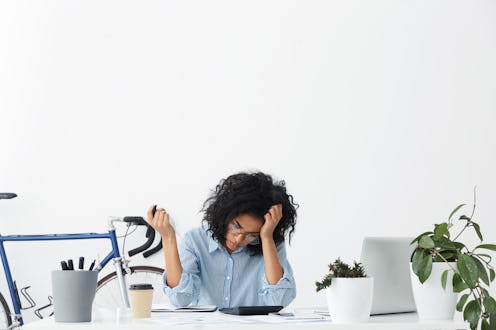Life
7 Expert-Approved Ways To Feel More Awake At Work
Wednesday may be hump day, but many of us experience a midday slump most days of the week. You know what I'm talking about: That time when your coffee wears off, when the minutes seem to move slower, and you could probably fall asleep while sitting at your desk, or even standing up. You've probably wondered many a time how to not be tired at work, because it sometimes feels like a herculean task.
"Many times, we experience fatigue because of a drop in our blood sugar or from general fatigue as related to our circadian rhythms (aka, medical speak for body's clock). There is a natural time where our body's temperature levels change, and around mid day we sometimes experience this, which can in turn lead to sleepiness," Dr. Shilpi Agarwal, a board-certified physician and author, tells Bustle.
Furthermore, Dr. Will Cole, a functional medicine practitioner, says that midday fatigue can be "due to a condition known as adrenal fatigue, which happens when there is an imbalance with your body's stress hormone, cortisol." He explains that, "in a healthy individual, cortisol starts high in the morning and slowly tapers off throughout the day. But in adrenal fatigue, cortisol is high when it should be low, low when it should be high, and generally just all over the place."
While an afternoon coffee run my seem like the quickest fix to your midday fatigue, Dr. Agarwal says to "Avoid over caffeinating because you feel tired. Although that afternoon latte sounds great, it usually interferes with sleep later on, and has a lot of sugar. If you are looking for something similar, go with decaf and try the non-sugary options."
Luckily, if you tend to get tired while you're stuck in the office, or if you have several hours on your shift left to go, you're not out of luck. Here are seven small things to try midday if you're feeling low energy.
1Eat Healthy Fats At Lunch
"Make sure you are getting in enough healthy fats throughout the day, especially in the morning. Since almost 60 percent of your brain is made up of fat, it makes sense to fuel your brain with exactly what it is made of rather than depriving it," says Dr. Cole. "Unlike sugar, fat is like a log to a fire — slow burning and long-lasting. Some of my favorite sources include wild-caught fish, coconut, avocado, and grass-fed ghee."
If you don't have time to pack a lunch or stand in line for a bite, opt to bring snack items like nuts, yogurt, or even dark chocolate that's at least 70 percent cocoa. Raising your blood sugar by making sure to eat will also prevent an energy crash later in the day, says Dr. Agarwal. Eating chocolate to boost your energy sounds like a win to me.
2Drink Ice Water
If you're not hungry, try sipping on some ice cold water. Dr. Agarwal explains that "the temperature change is a jolt and shock to the body, and can create alertness." Plus, according to Health, being dehydrated can also contribute to fatigue, so drinking water helps boost your energy in more way than one.
3Practice Mindfulness
Dr. Cole says, "A few minutes of mindfulness meditation can help calm your mind, and destress in the middle of a hectic workday." Try using a meditation app and tuning out for a second to clear some of that brain fog and fatigue.
4Take A Break
If meditation isn't your thing, try to take a mental break in the way most productive for you. "Usually if we try to fight through [our fatigue], productivity is lost and we feel more of a drag," says Dr. Agarwal. "Set an alarm for five to ten minutes and either rest your head, meditate, or watch a funny video. I usually advise doing this away from your desk, as it is a set time and then you can return feeling refreshed." Vine compilations, here I come.
5Talk It Out
When you're tired, the last thing you probably want to do is socialize. However, Dr. Agarwal says that doing just that may wake you up. "Chat with a coworker. The social interaction will require you to most likely get out of your chair and the engagement usually helps awaken the mind and therefore boost up energy," she explains.
6Try An Adaptogen
According to TIME, adaptogens are plants and herbs that help support your body's energy levels, reactions to stress, hormones, and your immune system. Though there's not a wealth of scientific studies done on these herbs (many of which were used in traditional medicine), research has suggest many show promise of doing what people claim they do.
"You can experiment with adding adaptogens like rhodiola, holy basil, and ginseng to your tea or water. These natural plant medicines have a balancing effect on cortisol," says Dr. Cole.
7Get Your Steps In
Both Dr. Agarwal and Dr. Cole agree that taking a walk, or simply getting out of your office chair can help combat fatigue. "Take a walk around the block or get out of your chair — the [energy] boost will come from a change in position, and get your heart rate up to combat tiredness," says Dr. Agarwal. Moreover, Dr. Cole adds that a walk will "release endorphins that give you that feel-good energy boost."
Some of these tips may work for you, while others not so much. Dr. Cole explains, "Ultimately, every person is different." Cole also suggests talking to your doctor if your fatigue is excessive or interfering in your day-to-day. Either way, if you constantly feel like falling asleep when you're updating a spreadsheet, you can try something new in your routine to stay awake.
